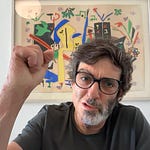Many people with injuries write to me because I openly discuss my injury, my life, and the insights I've gained. They reach out not so much about my specific injury but to seek advice on what they should do. When someone gets injured, it's evident what they've lost—imagine even losing a pinky; it's clear what's missing. But looking forward, thinking about what they might gain, and how things will improve is much tougher.
There's an intriguing psychological illusion where you ask people how much they've changed in the last 10 years. They usually say a lot. Then you ask them how much they expect to change in the next 10 years, and they say not much. The reality is that the change in the next decade will likely mirror the last one—maybe slightly slower, but still significant. However, when we look back, we see our growth clearly. When we think ahead, we feel like we've arrived at our final destination.
Injuries are tough because people focus on what they've lost and believe they've reached their peak. They can't envision how they'll continue to evolve. So, when people write to me about this, I try to convey a few key points.
First, I tell them to look at what they've accomplished. They've managed a tremendous injury with strength and resilience. Would they have believed they could handle so much pain and complexity? They should review this tough period and congratulate themselves for their incredible inner strength.
Second, I ask them to reflect on the people around them. How does their experience compare to what they would have expected before the injury? Did people fall short or exceed those expectations? Most find they have more support than they initially believed.
Next, I explain that the person they were is gone—especially if it's a substantial injury. There's no point in lamenting that loss. Instead, think about this new person. Focus on discovering their new life with its limitations and abilities.
Then, embark on a search for the next chapter of their life. Don't mourn the old self too much; instead, concentrate on uncovering new skills and abilities over the next decade.
At least people seem appreciative when I share this advice—I hope they're not just being polite. These three elements—recognizing our strength, appreciating social support, and discovering who we'll become—are crucial whether we're injured or not.











